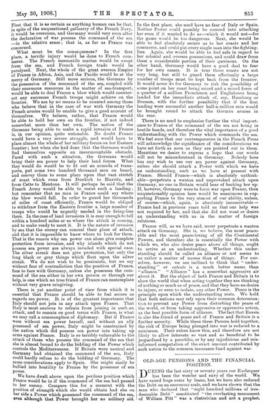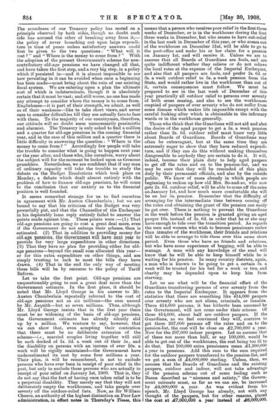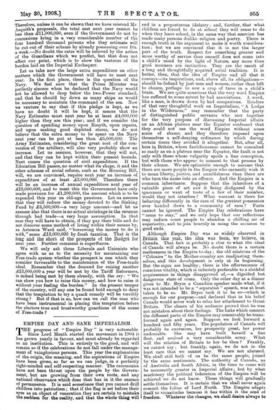OLD-AGE PENSIONS AND THE FINANCIAL POSITION.
DURING the last sixty or seventy years our Exchequer has been the wonder and envy of the world. We have raised huge sums by loans, but we have also reduced. the Debt on an enormous scale, and we have shown that the man who declared that "eight hundred millions of irre- deemable Debt" constituted "the everlasting monument of William Pitt" was a rhetorician and not a prophet. rhe soundness of our Treasury policy has rested on a principle observed by both sides, though no doubt each side has accused the other of breaking away from it,— the policy of never launching out upon large expendi- ture in time of peace unless satisfactory answers could first be given to the two questions : "What will it cost ? " and "Where is the money to come from ? " With the adoption of the present Government's scheme for non- contributory old-age pensions we have changed all that, and. have taken the first step, and a very big step, in a policy which if persisted in—and it is almost impossible to see how persisting in it can be avoided when once a beginning has been made—must bring about the ruin of our existing fiscal system. We are entering upon a plan the ultimate cost of which is indeterminate, though it is absolutely certain that it must be vast; and still worse, no one has made any attempt to consider where the money is to come from. Englishmen—it is part of their strength, we admit, as well as of their weakness—like to take short views, and never care to consider difficulties till they are actually face to face with them. To the majority of our countrymen, therefore, our attitude will no doubt seem unnecessarily pessimistic and alarmist. The Treasury is only asked to find a million and a quarter for old-age pensions in the coming financial year, and in the case of this million and a quarter there is little difficulty in answering the question : "Where is the money to come from ? " Accordingly few people will take the trouble to consider what is going to happen next year or the year after, and those who, like ourselves, worry about the subject will for the moment be looked upon as tiresome grumblers. Nevertheless, we are confident that if any man of ordinary capacity will take the trouble to study the debate on the Budget Resolutions which took place on Monday, a debate which dealt almost entirely with the problem of how to finance old-age pensions, he will come to the conclusion that our anxiety as to the financial position is well founded.
It seems somewhat strange for us to find ourselves in agreement with Mr. Austen Chamberlain ; but we are bound to say that his criticism of the Budget was very powerfully put, and that the Chancellor of the Exchequer in his deplorably lame reply entirely failed to answer the points made against him. These points were :—(1) That old-age pensions are going to cost a great deal more, even if the Government do not enlarge their scheme, than is estimated. (2) That in addition to providing money for old-age pensions, the Government will have next year to provide for very large expenditure in other directions. (3) That they have no plan for providing either for old. age pensions—beyond the small sum allocated this year— or for this extra expenditure on other things, and are simply trusting to luck to meet the bills they have drawn. (4) That in the end the only way of meeting these bills will be by recourse to the policy of Tariff Reform.
Let us take the first point. Old-age pensions are unquestionably going to cost a great deal more than the Government estimate. In the first place, it should be noted that Mr. Lloyd George in his answer to Mr. Austen Chamberlain repeatedly referred to the cost of old-age pensions not as six millions—the sum named by Mr. Asquith—but as seven millions. Thus, although Mr. Lloyd George insists that in the first year there must be no widening of the basis of old-age pensions, the Government estimate has already silently slid up by a million. We venture to say, however, that we can show that, even accepting their contention that there must be no deliberate extension of the scheme—i.e., married couples living together will still be each docked of is. 3d. a week out of their 5s., and the disability on persons with an income of over 10s. a week will be rigidly maintained—the Government have underestimated its cost by some four millions a year. Their plan, it will be remembered, is not to exclude persons who have ever been in receipt of poor relief in the past, but only to exclude those persons who are actually in receipt of poor relief on January 1st, 1909. That is, they do not say that the fact of having once taken relief is to be a perpetual disability. They merely say that they will not deliberately empty the workhouses, and take people over seventy off the outdoor-relief lists. Now, as Sir William Chance, an authority of the highest distinction on Poor Law administration, in effect notes in Thursday's Times, this 'means that a person who receives poor relief in the first three weeks of December, or is in the workhouse during the first three weeks in December, but who ceases to have out-relief in the last week in December of this year, or who comes out of the workhouse on December 31st, will be able to go to the post-office and make his or her claim for a pension on January 1st, and will receive it. Unless we are to assume that all Boards of Guardians are fools, and are quite indifferent whether they relieve or do not relieve the local rates at the expense of the Imperial Exchequer, and also that all paupers are fools, and prefer 2s. 6d. or 3s. a week outdoor relief to 5s. a week pension from the State, and would rather live in the workhouse than out of it, certain consequences must follow. We must be prepared to see in the last week of December of this year practically all outdoor relief to persons over seventy of both sexes ceasing, and also to see the workhouses emptied of paupers of over seventy who do not suffer from some disease which makes life impossible except with the careful looking after which is obtainable in the infirmary wards or in the workhouse generally.
Those who think that the Guardians will not aid and abet the desire of the aged pauper to get a 5s. a week pension rather than 2s. 6d. outdoor relief must know very little about Boards of Guardians. Boards of Guardians may often be extravagant, but at the same time they are extremely eager to show that they have reduced expendi- ture, and if they can do this without making themselves disagreeable to anybody they are certain to do it. It will, indeed, become their plain duty to help aged paupers to get off the rates and on to the pension-list, and we may be sure that they will be reminded of this plain duty by their permanent officials, and also by the outside public. We know of cases already in which people are beginning to reckon up how old Mrs. So-and-so, who now gets 2s. 6d. outdoor relief, will be able to come off the rates on January 1st, and how much more comfortable she will be on her 5s. pension. Remember that the difficulty of arranging for the intermediate time between coming off the rates and obtaining the grant of the pension can easily be got over. There is nothing to prevent the Guardians in the week before the pension is granted giving an aged pauper 10s. instead of 2s. 6d. in order that he or she may have enough to tide over the transition period. As regards the men and women who wish to become pensioners rather than inmates of the workhouse, their friends and relations will be able to arrange to tide them over this same short period. Even those who have no friends and relations, but who have some experience of begging, will be able to manage. A man with any knowledge of the road will know that he will be able to keep himself while he is waiting for his pension. In many country districts, again, a man who is known to be going to get a. certain 5s. a week will be trusted for his bed for a week or two, and charity may be depended upon to keep him from starving.
Let us see what will be the financial effect of the Guardians transferring persons of over seventy from the rates to the Imperial Exchequer. It appears from the statistics that there are something like 414,000 paupers over seventy who are not aliens, criminals, or lunatics. These 414,000 persons, it has hitherto been assumed by the Government, will not come under their scheme. Of these 414,000, about half are outdoor paupers. If the Guardians, as we feel convinced they will, contrive to get these 207,000 persons off the rates and on to the pension-list, the cost will be close on £2,700,000 a year. Now for the 207,000 indoor paupers. Let us assume that of these not more than half, or say 100,000, would be able to get out of the workhouses, the rest being too ill to do that. But 100,000 extra pensioners mean. £1,300,000 a year in pensions. Add this sum to the sum required for the outdoor paupers transferred to the pension-list, and we get a sum of £4,000,000 sterling. Unless, then, we assume that the Boards of Guardians and the existing paupers, outdoor and indoor, will not take advantage of the pension scheme out of some feeling such as Bacon described as "niceness and satiety," the Govern- ment estimate must, as far as we can see, be increased by £4,000,000 a year. As was evident from his speech, Mr. Lloyd George has already, not with any thought of the pau • rs, but for other reasons, placed the cost at £7,000 I II a year instead of £6,000,000. Therefore, unless it can be shown that we ha,ve misread Mr. Asquith's proposals, the total cost next year cannot be less than £11,000,000, even if the Government do not by concessions bring in a very considerable number of the four hundred thousand persons who they estimate will be cut out of their scheme by already possessing over 10s. a week.—No doubt the rates will be relieved by the action of the Guardians which we predict, but that does not affect our point, which is to show the vastness of the burden laid on the Imperial Exchequer.
Let us take now the large extra expenditure on other matters which the Government will have to meet next year. In the first place, there is the question of the Navy. We feel sure that the Prime Minister was perfectly sincere when he declared that the Navy would not be allowed to drop below the two-Power standard, and that he should lay down as many ships as would be necessary to maintain the command of the sea. Now we venture to say that if this pledge is kept, as we have no doubt it will be kept, it means that the Navy Estimates must next year be at least 24,000,000 higher than they are this year ; and if we consider the question of spending money upon Rosyth, upon repairs, and upon making good *depleted stores, we do not believe that the extra money to be spent on the Navy next year can be put at less than £5,000,000. The Army Estimates, considering the great cost of the con- version of the artillery, will also very probably show an increase. Let us assume, however, that they will not, and that they can be kept within their present bounds. Next comes the question of civil expenditure. If the Education Bill passes, no matter what its shape, it and the other schemes of social reform, such as the Housing Bill, will, we are convinced, require next year an increase of expenditure of at least £3,000,000. Therefore there will be an increase of annual expenditure next year of .218,000,000, and to meet this the Government have only made provision for £1,200,000, the amount which is to be expended this year on old-age pensions. Let us assume that they will reduce the money devoted to the Sinking Fund by £3,500,000—a very large amount—and let us assume also that there is no actual shrinkage in the revenue through bad trade—a very large assumption. In that case they will have to obtain, if they pay their bills and do not discover some method of living within their means by, as Artemus Ward said, "borrowing the money to do it with," some X13,000,000 by fresh taxation. That is the long and the short of the prospects of the Budget for next year. Further comment is superfluous.
We will only ask those Liberals and Unionists who agree with us as to the necessity for maintaining our Free-trade system whether the prospect is one which they consider favourable to the maintenance of the Free-trade ideal. Remember that the demand for raising another £13,000,000 a year will be met by the Tariff Reformers, is indeed being met by them already, with the cry : "We can show you how to raise this money, and how to raise it without your feeling the burden." In the present temper of the country, will any one be found bold enough to deny that the temptation to try a quack remedy will be terribly strong ? But if that is so, how can we call the men who have been instrumental in placing this temptation before the electors true and trustworthy guardians of the cause of Free-trade ?








































 Previous page
Previous page